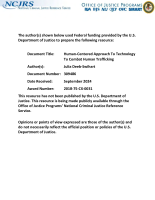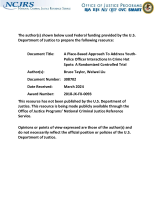Problem-oriented policing
What Is the Role of Police in Preventing Gang Membership?
City of Seattle Comprehensive Communities Program End of Grant Report, October, 1998
Seattle's Comprehensive Communities Program
Quiet Devolution: Thinking About the Roles of Police Middle Managers in Support of Community Policing
Community Policing in Seattle: A Descriptive Study of the South Seattle Crime Reduction Project
Community Policing in Madison: Quality From the Inside, Out: An Evaluation of Implementation and Impact, Technical Report
Community Policing in Madison, Quality From the Inside Out: An Evaluation of Implementation and Impact, Final Summary Report
SOLVING COMMUNITY PROBLEMS THROUGH POLICE DIRECTED PATROL
EVALUATION OF COMMUNITY CRIME/PROBLEM RESOLUTION THROUGH POLICE DIRECTED PATROL: EXECUTIVE SUMMARY
EVALUATION OF COMMUNITY CRIME/PROBLEM RESOLUTION THROUGH POLICE DIRECTED PATROL FINAL REPORT
Convincing the Recalcitrant: Reexamining the Minneapolis RECAP (Repeat Call Address Policing) Experiment
Experimenting With the Problem-Oriented Approach to Improving Police Service - A Report and Some Reflections on Two Case Studies, Volume 4
Repeat Sexual Offender in Madison - A Memorandum on the Problem and the Community's Response, Volume 3
Drinking-Driver in Madison - A Study of the Problem and the Community's Response, Volume 2
On the Front Lines: Case Studies of Policing in America's Cities
The Impact of a Youth-focused Problem-oriented Policing Initiative on Crime: Findings from a Randomized Controlled Trial in Three Cities
Factors that Facilitate and Hinder Implementation of a Problem Oriented Policing Intervention in Crime Hot Spots: Suggestions to Improve Implementation Based on a Field Experiment
Intelligence-Led Policing in New Jersey: Data Integration to Support the Investigation of Gun Crimes
Using Intelligence Analysis to Understand and Address Fentanyl Distribution Networks in America’s Largest Port City
A Place-Based Approach To Address Youth-Police Officer Interactions In Crime Hot Spots: A Randomized Controlled Trial
Police stops to reduce crime: A systematic review and meta-analysis
De-escalation Training: What Works, Implementation Lessons, and Taking It to Scale; Plenary at the 2023 NIJ Research Conference
Police use of force, while infrequently used, is a tremendous concern to public safety in the United States when officers employ it excessively or inappropriately, causing injury or death and eroding public trust in law enforcement. This plenary from the 2023 NIJ Research Conference describes the Integrating, Communications, Assessment, and Tactics (ICAT) de-escalation training program developed by the Police Executive Research Forum to guide officers in defusing critical incidents.
See the YouTube Terms of Service and Google Privacy Policy




